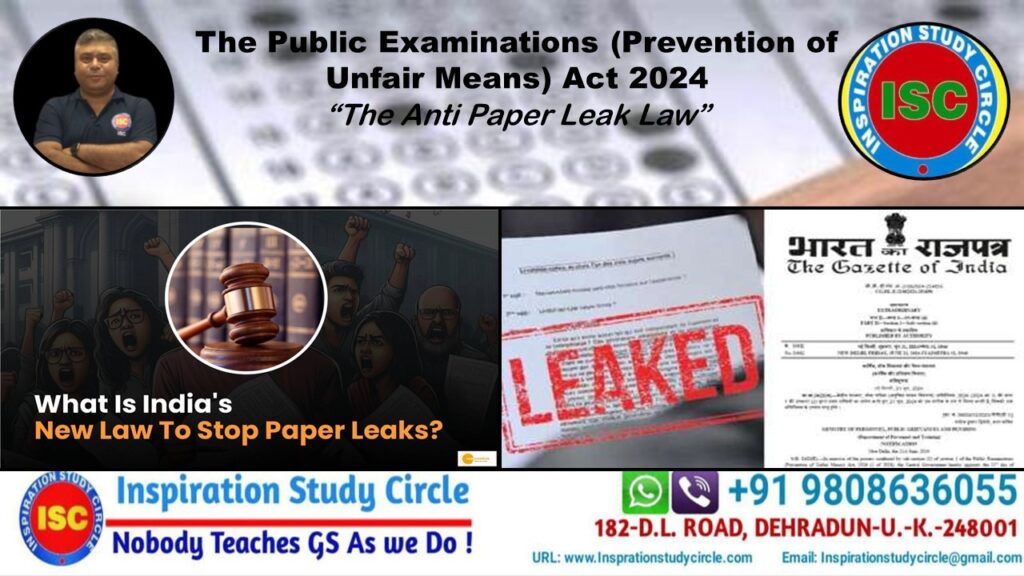Inspiration Study Circle Explained: Anti Paper Leak Law 2024
Table of Contents
Inspiration Study Circle Explained: Anti Paper Leak Law 2024
The center draws attention to anti-paper leak law amid the row of NEET and UGC NET exams: Rs 1 crore fine, up to 10 years in jail for offenders.
The move assumes significance amid the raging controversy over the cancellation of UGC-NET 2024 following prima facie indications that the integrity of the examination may have been compromised. The Act provides penalties for these offenses, including imprisonment ranging from three to five years and a fine of up to ₹10 million. In addition, it prohibits service providers from relocating examination centers without the approval of the examination authority.

The Public Examinations (Prevention of Unfair Means) Act, 2024
The Public Examinations (Prevention of Unfair Means) Act, 2024, which came into effect on June 21, introduces stringent penalties for those found guilty of malpractices. A gazette notification issued by the Ministry of Personnel, Public Grievances and Pensions said, “In exercise of the powers conferred by sub-section (2) of section 1 of the Public Examinations (Prevention of Unfair Means) Act, 2024 (1 of 2024), the central government at this moment appoints the 21st day of June 2024, as the date on which the provisions of the said Act shall come into force.”
The two Houses of Parliament passed the Bill in the Budget session which concluded on February 10. It seeks to prevent the use of “unfair means” in public examinations and bring “greater transparency, fairness and credibility”.
Examination service providers are also liable under the law. Those who fail to report any violations can be fined up to ₹1 million. Additionally, senior officials of service providers involved in malpractices can face imprisonment ranging from three to ten years along with a fine of ₹1 million.
If the probation authority or service provider commits an organized crime, the jail term will be a minimum of five years and, a maximum of 10, and the fine will remain at ₹1 million. The law mentions the Bharatiya Nyaya Sanhita and specifies that the provisions of the Indian Penal Code will remain in force until its implementation.
Before this legislation, no specific substantive law dealt with wrongful means or crimes committed by various entities involved in public examinations by the Central Government and its authorities.
At a press conference, Education Minister Pradhan described the allegations of leaks as isolated incidents but acknowledged moral responsibility. The opposition has criticized the government over the issues and the matter is expected to be discussed in the upcoming session of parliament.
The NEET and NET row that resulted in the law
The move assumes significance amid a raging controversy over the scrapping of the University Grants Commission National Eligibility Test (UGC-NET) in 2024, following prima facie indications that the integrity of the examination may have been compromised. It was canceled just a day after more than 9 million candidates appeared for it in 317 cities. This also became the first centrally conducted public examination to be canceled after the Center introduced the new anti-paper leak law.
The Education Ministry’s decision is said to have come as a surprise to senior NTA officials, given that it was already under fire for alleged irregularities in the conduct of the NEET bachelor’s exam, the results of which were announced on June 4.
After NEET and UGC-NET exams, the CSIR-UGC NET exam is the latest to be hit by paper leak allegations. This examination serves as a qualifying test to determine eligibility for a Junior Research Fellowship (JRF) and Lectureship in Science in Indian Universities, making it a key criterion for PhD admission.
The Characteristics of the Public Examinations (Prevention of Unfair Means) Act, 2024
The new law enforces strict penalties to prevent exam malpractice:
- Penalties for cheating: Individuals caught using unfair means during examinations face a minimum of three years imprisonment, extendable to five years, with fines of up to ₹10 lakh. The prison term can be extended if the fine is not paid.
- Penalties for testing agencies: Testing agencies or “service providers” face a fine of up to ₹1 crore. Additionally, they may be banned from conducting any public examination for four years. The Act also mandates the recovery of pro rata examination costs from these agencies.
- Liability of top management: Top management involved in exam malpractice can face up to 10 years in prison and a fine of ₹1 crore.
- Organised Cheating Penalties: Those involved in organised cheating face a minimum of five years in prison, extendable to ten years, along with fines of at least ₹1 crore.
- Exemption Clause: The law does not apply to individuals who can prove that the offense occurred without their knowledge and that they tried their best to prevent it.
- Offences Cognisable and Non-Bailable: All offenses under the Act are cognizable and non-bailable, ensuring immediate and stringent action against offenders.
The “Public Examinations” defined in the Act
Under Section 2(k), a “public examination” is defined as any examination conducted by a “public examination authority” listed in the Schedule of the Act, or any “such other authority as may be notified by the Central Government”.
The schedule lists five public examination authorities: (i) the Union Public Service Commission (UPSC), which conducts the Civil Services Examination, Combined Defence Services Examinations, Combined Medical Services Examination, Engineering Services Examination, etc.; (ii) the Staff Selection Commission (SSC), which recruits for Group C (non-technical) and Group B (non-gazetted) jobs in the central government; (iii) the Railway Recruitment Boards (RRBs), which recruit Groups C and D staff in the Indian Railways; (iv) the Institute of Banking Personnel Selection (IBPS), which hires at all levels for nationalized banks and regional rural banks (RRBs); and (v) National Testing Agency (NTA), which conducts the JEE (Main), NEET-UG, UGC-NET, the Common University Entrance Test (CUET), etc.
Apart from these designated public examination authorities, all “Ministries or Departments of the Central Government and their attached and subordinate offices for recruitment of staff” also come under the purview of the new law.
The central government can add new authorities to the schedule through a notification as and when required.
Reasons to Bring out the Act
There have been a large number of recruitment exam question paper leaks across the country in recent years – the UGC-NET leak and the many questions raised about NEET-UG in recent weeks are part of the same unfortunate trend.
Before these recent incidents, an investigation by The Indian Express found at least 48 cases of paper leaks in 16 states in the last five years where the recruitment process for government jobs was disrupted. The leaks affected the lives of at least 1.51 million applicants for roughly 1.2 million jobs.
A statement on the objects and reasons for the bill said: “Foul practices in public examinations lead to delays and cancellations of examinations, adversely affecting the prospects of millions of young people. There is currently no specific substantive law dealing with the unfair means adopted or the crimes committed… Elements which exploit the weaknesses of the examination system must be identified and effectively dealt with by comprehensive central legislation.”
The Statement added: “The objective of the Bill is to bring greater transparency, fairness, and credibility to the public examination systems and to reassure the youth that their sincere and genuine efforts will be fairly rewarded and their future is safe.
“The Bill is aimed at effectively and legally deterring persons, organized groups or institutions that indulge in various unfair means and adversely impact the public examination systems for monetary or wrongful gains.”
It clarified that “Candidate as defined in the Bill shall not be liable for action within the purview of the Bill and shall continue to be covered under the extant administrative provisions of the concerned public examination authority.”
Way Forward and Benefits
An “anti-paper leak law” typically refers to legislation or measures put in place to prevent the leaking or unauthorized disclosure of exam papers or test materials. Here are some potential advantages of such a law:
- Preserving the integrity of examinations: Anti-paper leak laws help maintain the integrity of exams by reducing the chances of leaks or unauthorized access to question papers. This ensures that the evaluation process remains fair and unbiased.
- Promoting meritocracy: By preventing paper leaks, the law helps create a more level playing field for all test-takers. It ensures that individuals are evaluated solely based on their knowledge, skills, and performance, rather than benefiting from unfair advantages gained through leaked materials.
- Enhancing credibility and trust: Anti-paper leak laws contribute to building trust and confidence in the examination system. When students and the public have faith in the examination process, it encourages participation and promotes a sense of fairness and transparency.
- Preventing cheating and fraud: Leak-free exams reduce the opportunities for cheating and fraud. It discourages unscrupulous practices such as purchasing or distributing leaked papers, thereby maintaining the authenticity and reliability of the assessment process.
- Reducing stress and anxiety: When there are no concerns about paper leaks, students can focus on their studies and preparation without the added stress and anxiety of uncertainty. This can lead to better performance and overall well-being.
- Ensuring standardization: Anti-paper leak laws contribute to maintaining standardized tests and assessments. When question papers are secure and confidential, it ensures that all students are evaluated based on the same set of questions, allowing for meaningful comparisons and analysis of results.
It’s important to note that the effectiveness of anti-paper leak laws depends on their implementation, enforcement, and the overall security measures put in place by educational institutions and examination bodies.
Disclaimer: The information, and facts for the above are taken from the Economic Express, India Today and the Indian Express news platform.
Recent Post

UKPSC- PCS 2026 Prelims Test Series
UKPSC- PCS 2026 Prelims Test Series Table of Contents UKPSC- PCS 2026 Prelims Test Series The Uttar Pradesh Provincial Civil

Explained: India AI Impact Summit 2026
Explained: India AI Impact Summit 2026 Table of Contents India AI Impact Summit 2026 India AI Impact Summit 2026 The India

The Corruption Perceptions Index, and The Henley Passport Index
The Corruption Perceptions Index, and The Henley Passport Index Table of Contents The Corruption Perceptions Index, and The Henley Passport

India- USA Interim Trade Agreement (2026)
India- USA Interim Trade Agreement (2026) Table of Contents India- USA Interim Trade Agreement (2026) In early February 2026, India and

Explained: India- EU FTA “The Mother of All Deals”
Explained: India- EU FTA “The Mother of All Deals” Table of Contents India- EU FTA “The Mother of All Deals

UPPSC- 2026 Calendar Released
UPPSC- 2026 Calendar Released Table of Contents UPPSC- 2026 Calendar Released Brought to you by Inspiration Study Circle UPPSC- 2026
